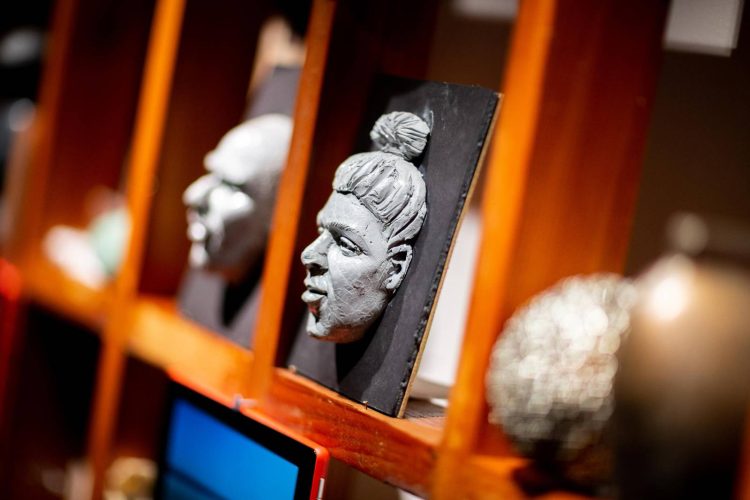Roma Pavilion at the 23rd Triennale Milano International Exhibition – Unknown Unknowns: An Introduction to Mysteries

Emília Rigová: altaRIG, 2020, multimedia installation, detail
The European Roma Institute for Arts and Culture (ERIAC) is proud to present Emília Rigová: And the One Doesn’t Stir without the Other, curated by Timea Junghaus, an official Roma exhibition at the 23rd Triennale Milano International Exhibition, entitled Unknown Unknowns: An Introduction to Mysteries.
The exhibition comprises installation, video, photography, found objects, and a community art project. At the centre is the altar honouring the oeuvre, career, life and success of Bári Raklóri (bári = big, raklóri = daughter of non-Roma parents), the artist’s alter ego which has become a leitmotif of her visual work over the past decade. Referring to Rigová’s Roma origin and family history, the persona of Bári Raklóri allows the artist to evade the collective Roma identity as a minoritarian artist and facilitates acts of self-definition and freedom. Her alias functions as a catalyst to narrate and embrace her Roma origins, connecting her individual experience to the stories shared by members of the Milanese Roma community invited to contribute to the project by mounting their own altars, and displaying personal memories and stories, thus illuminating the intangibility of their polyphonic community. The altar formula provides a sumptuous yet probing vehicle to evoke the complexity of concepts, such as identity, authenticity, ethnicity, representation, hybridity, race, class, migration, globalisation, and power. Building on Roma cosmology and forms of knowledge, and delving into the richness of their spiritual and material traditions, Rigová aptly uses the stories evoked by the altars to develop narratives and to cultivate a self-determined imaginarium of Europe’s largest ethnic minority. In elaborating hidden Roma (her-)stories rooted in affective familial rhizomes, the artist reveals their entanglement with overarching historical, national narratives in Europe. Through her collaboration with the community, the exhibition unfolds as a site-specific Wunderkammer, the tangible materialisation of diversity of Roma identities and experiences, despite the homogenizing majoritarian narrative. This resonatory cabinet becomes simultaneously a mode of quasi scientific inquiry, a transformative pedagogy, and a powerful resource for embodied praxis that community members can employ, in acts of radiant defiance, in their quotidian encounters with systemic anti-Gypsyism.
Artist:
Emília Rigová is a visual artist from the Slovak Republic. In addition to her engagement with art, she teaches art courses (object, multi-media, inter-media) at Matej Bel University in Banská Bystrica. For Rigová, an object in the form of an installation or a performance or a site-specific intervention is a basic element of her art language. Further, she expresses herself through the 2D interface of computer graphics, informed by the fundaments of classical painting. Concerning the content of her work, she explores the intersubjectivity of emotions mediated by a specific socio-cultural environment. The main themes of her works are cultural or social stereotypes, her alter ego, Romani identity, and the psychology of the individual. She is a laureate of Oskár Čepan Award 2018 and Roma Spirit 2018.
Curator:
Tímea Junghaus is an art historian and contemporary art curator. She has been Executive Director of the European Roma Institute for Arts and Culture since September 2017. Her curatorial works include the Roma component of the Hidden Holocaust exhibition in the Budapest Kunsthalle (2004), Paradise Lost – the First Roma Pavilion at the 52nd Venice Contemporary Art Biennale (2007), the Archive and Scholarly Conference on Roma Hiphop (2010), The Romani Elders and the Public Intervention for the Unfinished Memorial to the Sinti and Roma Murdered Under the National Socialist Regime at the 7th Berlin Biennale (2012), the (Re-)Conceptualizing Roma Resistance – exhibition and education program in Hellerau, Dresden (2015) and the Goethe Institute, Prague (2016). She is the curator of the Visual Arts Section for RomArchive – Digital Archive of the Roma. Junghaus was the founding director of Gallery8 – Roma Contemporary Art Space (www.gallery8.org) in Budapest (2013-2017), the winner of the 2014 Catalyst Contemporary Art Award (of tranzit Hungary) and the 2014 Otto Pankok Prize awarded by the For Roma Foundation of German writer and Literary Nobel Laureate, Günter Grass. In recognition of her curatorial activities, Junghaus received the Kairos – European Cultural Price from the Alfred Toepfer Stiftung F.V.S., in 2008.
Commissioner:
The European Roma Institute for Arts and Culture (ERIAC), as a joint initiative of the Council of Europe, the Open Society Foundations, and the Roma Leaders’ initiative – the Alliance for the European Roma Institute for Arts and Culture, has a unique mandate as the transnational, European-level organisation for the recognition of Roma through the means of arts and culture. ERIAC offices in Berlin and Belgrade support a broad network of Roma individuals and organisations working in the fields of arts and culture, giving space to a contemporary art gallery and educational programmes. ERIAC exists to increase the self-esteem of Roma and to decrease negative prejudice of the majority population towards the Roma through arts, culture, history, and language education.
About the 23rd International Exhibition:
The 23rd Triennale Milano International Exhibition, entitled Unknown Unknowns: An Introduction to Mysteries, opens on 15 July and runs until 11 December 2022. By examining the theme of the unknown, exploring “what we don’t know we don’t know”, through a constellation of exhibitions, installations and special projects, the 23rd International Exhibition expands our view into what remains outside of our understanding: from the far reaches of outer space to the depths of the oceans, from the mysteries of consciousness to the environment we live in.
Contacts:
Triennale Milano
Viale Alemagna 6
20121 Milan
T. +39 02 724341
www.triennale.org
Emília Rigová: And the One Doesn’t Stir without the Other
at the 23rd Triennale Milano International Exhibition – Unknown Unknowns: An Introduction to Mysteries.
Curated by Timea Junghaus
Commissioned by the European Roma Institute for Arts and Culture (ERIAC)
Opening Event: 14 July at 3 pm
Public Dates: 15 July – 11 December 2022
https://eriac.org/milantriennale/

[…] Next Blog Entry […]
[…] Previous Blog Post […]